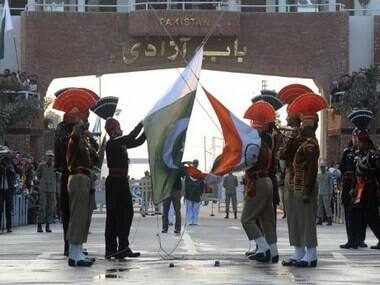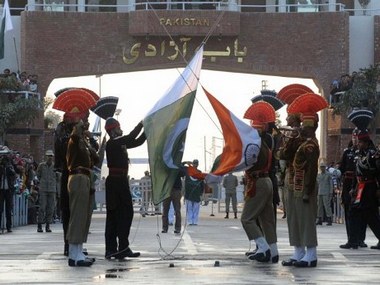“Excuse me, but would you mind meeting my daughter for a few minutes?” the man at the Lahore Gymkhana Club, all full of social graces, asked me. The request, from someone whom I had been introduced to only minutes earlier, struck me as most unusual. But so endearing was the mehman-baazi that I’d encountered during my visit to Pakistan in 2004 that I cheerily consented. “You see,” the gentleman said by way of explanation, as we walked over to the table where his wife and 10-year-old daughter were seated, “she’s never met an Indian – and she has to do a school project on India. So, when I met you, quite by chance, I thought it might be good for her too to meet an Indian in flesh and blood!” Quixotic things happen to Indians when they travel to Pakistan – and likewise, to Pakistanis when they travel to India. For all the strains at the governmental level between the two countries, there is an idle curiosity about each other at the street level, which defies the inability of the two countries to find the right idiom of discourse. Much the same experience as I had in Lahore – of being an Indian with the “gawk appeal” of a Martian, perhaps - happens to Pakistanis when they cross the Wagah border. Prof Pervez Hoodbhoy recalls (
here
) that while on a lecture tour of schools, colleges and universities across India in 2005, he discovered that “only a handful of (Indian) students had ever seen a living, breathing Pakistani.” A 12-year-old school student, who evidently did not know that Hindi and Urdu were similar, wondered aloud how a “real Pakistani” could be speaking their language, Hoodbhoy recalls. “For these puzzled students, Pakistanis are alien people belonging to an adversary country, not next-door neighbours.” One reason for the misperceptions and colossal ignorance of people on both sides of the border about the other, of course, is that the primary source of information of each other are media accounts, which tend to play up the polarities at the governmental level, and don’t do enough justice to the mutual curiosity at the people-to-people level. Additionally, the complex visa regime that keeps even well-meaning Indians and Pakistanis from visiting each other’s countries renders social, humanising interactions something of a rarity. Families that were sundered by the Partition of 1947 have met only fleetingly; on my visit in 2004, I became the bearer of cross-border familial gifts to and from my friends who had cousins in Pakistan that they hadn’t met in decades. If Indian visa rules are
seen to “persecute” Pakistanis
– not only from Pakistan, but elsewhere as well - it’s because they do sometimes persecute. [caption id=“attachment_320068” align=“alignleft” width=“380” caption=“If Indian visa rules are seen to “persecute” Pakistanis – not only from Pakistan, but elsewhere as well - it’s because they do sometimes persecute. AFP”]
 [/caption] Of course, Indian wariness of all things Pakistani also owes to the history of hostility, including the unabashed sponsorship of India-directed terrorism by Pakistan to this day. As the reason for the high entry barrier that India erects for Pakistanis, Indian officials unfailingly point to the case of David Headley, the US citizen of Pakistani origin who “cased the joint” in Mumbai ahead of the November 2008 terrorist attack. And in Pakistan too, Hoodbhoy recounts, Pakistani s who wish to apply for an Indian visa are physically intimidated by Pakistani intelligence and security officials. He writes: “As I attempted to enter the (Indian High Commission) building’s visa section, a swarm of Pakistani intelligence agents surrounded me. Their body language was intimidating, their manner offensive. As with other visa applicants, question followed question. They demanded my personal identification, phone numbers, family details, what was to be discussed in the conference that I was to attend, invitation letters and proof of correspondence. All this while sneering at my patriotism.” Such mutual animosity at the official level and the erection of artificial walls between the people of both countries is completely at dissonance with the openness of mind with which the two peoples interact – on the rare occasions that they do. Today’s meeting of the Home Secretaries of the two countries, which focusses on a liberalised visa regime between the two countries, is one small step in bridging this artificial divide. From an Indian perspective, the genuine consideration of heightened security ought not to inhibit a loosening of visa restrictions for Pakistanis who wish to travel to India, for business or for pleasure. Popular Pakistani perceptions about India too are changing for the better, at least among the liberal constituency that is fighting to expand the cramped space they have in civil society. As
this writer observes
, in contrast to Pakistan’s descent into the hell world of jihadi terrorism in recent years, India’s rise as secular-liberal country, and an economic power, commands enormous interest. He writes: “We have tried India as an enemy and it has cost us dearly. It’s time to try India as a friend because the cost of being a friend is far, far less than the cost of being an enemy.” That sentiment is widely shared in other spheres as well. Pakistani players may not be playing in the IPL – and Indian spectators themselves may be tiring of the IPLs - but cable television channels in Pakistan’s big cities clandestinely beam matches because there is an abiding interest in them. Pakistani performing artists are thirsting for a chance to perform in India; Bollywood, of course, remains the ultimate dream. For India, rewarding the liberal constituency in Pakistan – including with ease of travel in India - is an investment in its own security. If more Pakistanis experience first-hand the liberal openness that characterises India (in the main), the less susceptible will they be to domestic propagandist accounts that project India as a threat to their country. That abridges the space for hate-mongers, including the Pakistani security/strategic community, which has a vested interest in perpetuating mutual animosity. All this is not to say that India must make territorial or other concessions to Pakistan at the governmental or the military level. Those interlocutions must await confirmation that Pakistan is earnest about cracking down on India-directed terror originating from its soil. Thus far, we’ve seen little evidence of that. To that extent, there ought not to be any lowering of the security bar that we’ve set for official Pakistan. Yet, Indian statecraft is mature enough to make the distinction between standing one’s ground at the official level and facilitating ease of interaction at the people’s level – and see the latter as a move that advances both India’s economic and security interests in the long run. To that extent, there’s a case for celebrating the liberalised visa regime with Pakistan. Let Pakistanis and Indians interact, and learn from personal interaction that we aren’t the Martians we imagine each other to be.
[/caption] Of course, Indian wariness of all things Pakistani also owes to the history of hostility, including the unabashed sponsorship of India-directed terrorism by Pakistan to this day. As the reason for the high entry barrier that India erects for Pakistanis, Indian officials unfailingly point to the case of David Headley, the US citizen of Pakistani origin who “cased the joint” in Mumbai ahead of the November 2008 terrorist attack. And in Pakistan too, Hoodbhoy recounts, Pakistani s who wish to apply for an Indian visa are physically intimidated by Pakistani intelligence and security officials. He writes: “As I attempted to enter the (Indian High Commission) building’s visa section, a swarm of Pakistani intelligence agents surrounded me. Their body language was intimidating, their manner offensive. As with other visa applicants, question followed question. They demanded my personal identification, phone numbers, family details, what was to be discussed in the conference that I was to attend, invitation letters and proof of correspondence. All this while sneering at my patriotism.” Such mutual animosity at the official level and the erection of artificial walls between the people of both countries is completely at dissonance with the openness of mind with which the two peoples interact – on the rare occasions that they do. Today’s meeting of the Home Secretaries of the two countries, which focusses on a liberalised visa regime between the two countries, is one small step in bridging this artificial divide. From an Indian perspective, the genuine consideration of heightened security ought not to inhibit a loosening of visa restrictions for Pakistanis who wish to travel to India, for business or for pleasure. Popular Pakistani perceptions about India too are changing for the better, at least among the liberal constituency that is fighting to expand the cramped space they have in civil society. As
this writer observes
, in contrast to Pakistan’s descent into the hell world of jihadi terrorism in recent years, India’s rise as secular-liberal country, and an economic power, commands enormous interest. He writes: “We have tried India as an enemy and it has cost us dearly. It’s time to try India as a friend because the cost of being a friend is far, far less than the cost of being an enemy.” That sentiment is widely shared in other spheres as well. Pakistani players may not be playing in the IPL – and Indian spectators themselves may be tiring of the IPLs - but cable television channels in Pakistan’s big cities clandestinely beam matches because there is an abiding interest in them. Pakistani performing artists are thirsting for a chance to perform in India; Bollywood, of course, remains the ultimate dream. For India, rewarding the liberal constituency in Pakistan – including with ease of travel in India - is an investment in its own security. If more Pakistanis experience first-hand the liberal openness that characterises India (in the main), the less susceptible will they be to domestic propagandist accounts that project India as a threat to their country. That abridges the space for hate-mongers, including the Pakistani security/strategic community, which has a vested interest in perpetuating mutual animosity. All this is not to say that India must make territorial or other concessions to Pakistan at the governmental or the military level. Those interlocutions must await confirmation that Pakistan is earnest about cracking down on India-directed terror originating from its soil. Thus far, we’ve seen little evidence of that. To that extent, there ought not to be any lowering of the security bar that we’ve set for official Pakistan. Yet, Indian statecraft is mature enough to make the distinction between standing one’s ground at the official level and facilitating ease of interaction at the people’s level – and see the latter as a move that advances both India’s economic and security interests in the long run. To that extent, there’s a case for celebrating the liberalised visa regime with Pakistan. Let Pakistanis and Indians interact, and learn from personal interaction that we aren’t the Martians we imagine each other to be.
Venky Vembu attained his first Fifteen Minutes of Fame in 1984, on the threshold of his career, when paparazzi pictures of him with Maneka Gandhi were splashed in the world media under the mischievous tag ‘International Affairs’. But that’s a story he’s saving up for his memoirs… Over 25 years, Venky worked in The Indian Express, Frontline newsmagazine, Outlook Money and DNA, before joining FirstPost ahead of its launch. Additionally, he has been published, at various times, in, among other publications, The Times of India, Hindustan Times, Outlook, and Outlook Traveller.
)